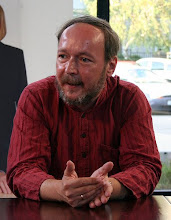
Last Saturday I participated in a panel discussion on the theme "Marriage, Mental Illness and Law: an Indian Context". The unusual discussion at the Continuing Medical Education event for the first time covered user and carer perspectives as well as the views of a psychiatrist. The discussion was moderated by Amita Dhanda. The session resulted in a rather incoherent and emotionally driven debate on the need for force in psychiatry and other issues. The user and carer perspectives were more or less treated as if they had not been articulated the debate focussed on Amita's comments. The experience raises the question if such meetings are useful for human rights advocates at all. For me this was just exhausting time waste and trigger of traumatic experiences.

3 comments:
Lately, as a survivor of psychiatry, I have been concerned about the dissonance between universal human rights frameworks and activism and user / survivor experiences. Human rights people are not necessarily including of personal experiences, dealing with such expressions (negatively) as a 'post modern' search for self identity or as 'unprofessional'. This is the situation in my immediate milieu, which I think is fairly human rights sensitive. This attitude curbs freedom of expression. You do feel diminished. We need to strongly advocate for personal rights, including the right to build knowledge on the basis of self experience and the freedom of expression. Bhargavi V, Bapu Trust.
One of the questions that stands out in our minds is this - why did the psychiatrists feel the need to be so defensive? Is it because they are threatened to see that we as users stake claim to an identity and are comfortable enough to assert ourselves as both human individuals and as users?
Second question is - how do we infiltrate this knowledge power structure and seize claim to our right to know and be known by a system that claims to want to help us? The medical system does a poor job of advancing the voice of the patient as a human individual and as an important and valuable source of information. The result is large numbers of mental health professionals who are unaccustomed to listening to people with illness as people. Perhaps the human rights world operates in a similar manner. How do we give ourselves equal standing within these information systems? These are questions we would like to put forth for discussion.
-Laura, on behalf of Anjali Mental Health and Human Rights
Post a Comment